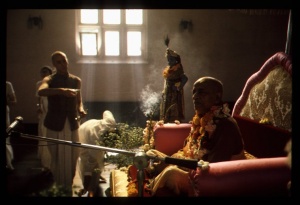CC Madhya 14.163: Difference between revisions
No edit summary |
(Vanibot #0054 edit - transform synonyms into clickable links, which search similar occurrences) |
||
| Line 19: | Line 19: | ||
<div class="synonyms"> | <div class="synonyms"> | ||
''aheḥ'' | ''[//vanipedia.org/wiki/Special:VaniSearch?s=aheḥ&tab=syno_o&ds=1 aheḥ]'' — of the snake; ''[//vanipedia.org/wiki/Special:VaniSearch?s=iva&tab=syno_o&ds=1 iva]'' — like; ''[//vanipedia.org/wiki/Special:VaniSearch?s=gatiḥ&tab=syno_o&ds=1 gatiḥ]'' — the movement; ''[//vanipedia.org/wiki/Special:VaniSearch?s=premṇaḥ&tab=syno_o&ds=1 premṇaḥ]'' — of the loving affairs; ''[//vanipedia.org/wiki/Special:VaniSearch?s=svabhāva&tab=syno_o&ds=1 svabhāva]'' — by nature; ''[//vanipedia.org/wiki/Special:VaniSearch?s=kuṭilā&tab=syno_o&ds=1 kuṭilā]'' — crooked; ''[//vanipedia.org/wiki/Special:VaniSearch?s=bhavet&tab=syno_o&ds=1 bhavet]'' — is; ''[//vanipedia.org/wiki/Special:VaniSearch?s=ataḥ&tab=syno_o&ds=1 ataḥ]'' — therefore; ''[//vanipedia.org/wiki/Special:VaniSearch?s=hetoḥ&tab=syno_o&ds=1 hetoḥ]'' — from some cause; ''[//vanipedia.org/wiki/Special:VaniSearch?s=ahetoḥ&tab=syno_o&ds=1 ahetoḥ]'' — from the absence of a cause; ''[//vanipedia.org/wiki/Special:VaniSearch?s=ca&tab=syno_o&ds=1 ca]'' — ''and; ''[//vanipedia.org/wiki/Special:VaniSearch?s=yūnoḥ&tab=syno_o&ds=1 yūnoḥ]'' — of the young couple; ''[//vanipedia.org/wiki/Special:VaniSearch?s=mānaḥ&tab=syno_o&ds=1 mānaḥ]'' — anger; ''[//vanipedia.org/wiki/Special:VaniSearch?s=udañcati&tab=syno_o&ds=1 udañcati]'' — appears. | ||
</div> | </div> | ||
Latest revision as of 21:45, 19 February 2024

His Divine Grace
A.C. Bhaktivedanta Swami Prabhupada
A.C. Bhaktivedanta Swami Prabhupada
TEXT 163
- aher iva gatiḥ premṇaḥ
- svabhāva-kuṭilā bhavet
- ato hetor ahetoś ca
- yūnor māna udañcati
SYNONYMS
aheḥ — of the snake; iva — like; gatiḥ — the movement; premṇaḥ — of the loving affairs; svabhāva — by nature; kuṭilā — crooked; bhavet — is; ataḥ — therefore; hetoḥ — from some cause; ahetoḥ — from the absence of a cause; ca — and; yūnoḥ — of the young couple; mānaḥ — anger; udañcati — appears.
TRANSLATION
“‘The progress of loving affairs between a young boy and a young girl is by nature crooked, like the movement of a snake. Because of this, two types of anger arise between a young boy and girl—anger with a cause and anger without a cause.’”
PURPORT
This is a quotation from Śrīla Rūpa Gosvāmī’s Ujjvala-nīlamaṇi (Śṛṅgāra-bheda-prakaraṇa 102).